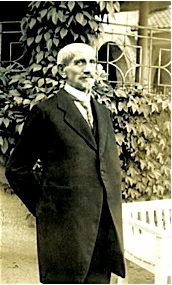Julius Heinrich Zimmermann
Julius Heinrich Zimmermann (born September 22, 1851 in Sternberg ; † April 25, 1922 in Berlin ) was a musical instrument manufacturer and music publisher of Mecklenburg origin who had long been active in Russia .
Activity in Russia
After completing his banking apprenticeship in Berlin, Zimmermann was transferred to Saint Petersburg in 1876 , where he opened a brass instrument factory in 1880 and registered the “JHZ” brand. He brought instrument makers from Markneukirchen, including the brass instrument maker Josef Schimmer (father of the violinist Roman Schimmer), first to Saint Petersburg, then to Moscow and later to Riga, into his special workshop for string, brass, woodwind and tongue instruments . From 1901 Zimmermann was the court supplier for wind instruments of his own production for the Tsar's house and exclusively for the Russian army . He dominated the music trade there until the outbreak of the First World War .
Return to Germany
In 1886 he went back to Germany to settle in Leipzig and to found the new headquarters of his companies here, which also included Zimmermann Musikverlag . From 1893 the company went regularly to the world exhibitions and won numerous gold medals for its instruments. In 1901, Julius Heinrich Zimmermann received the Imperial and Royal Russian Order of Saint Stanislaus from Tsar Nicholas II for his services .
In 1900 Adler-Musikwerke in Leipzig passed into his hands. The Fortuna brand for jukeboxes was registered, new models such as the "Orgophon" and the "Cantophon" were developed and a patent application for speaking machines was made. In 1904 Zimmermann acquired the piano factory from Gustav Fiedler and continued to manufacture pianos under this name. The piano brand “Jul. Heinr. Zimmermann ”was only intended for the Leipzig area. The piano factory also produced harmoniums and mechanical musical works.
From 1912 to 1918 he was also a member of the German Reichstag for the constituency of the Grand Duchy of Mecklenburg-Schwerin 2 ( Schwerin , Wismar ) and the National Liberal Party .
With the outbreak of World War I, the company was viewed as a hostile asset in Russia and nationalized in 1919. The brass instrument factory was re-established after the Second World War and, after privatization in 1991, still exists today under the name “St. Petersburg Musical Wind Instruments Factory ”.
In 1919 he founded further branches in Markneukirchen . Until 1936, mainly balalaikas were built there, manufactured by Paul Fischer, who later made a name for himself.
literature
Lomtev D. Deutsche in the musical infrastructure of Russia . Lage (Westf.) 2012. pp. 62–63, 123–126.
Individual evidence
- ↑ Imperial Statistical Office (Ed.): The Reichstag elections of 1912 . Issue 2. Berlin: Verlag von Puttkammer & Mühlbrecht, 1913, p. 101 (Statistics of the German Reich, Vol. 250)
| personal data | |
|---|---|
| SURNAME | Carpenter, Julius Heinrich |
| BRIEF DESCRIPTION | German musical instrument manufacturer and politician (NLP), MdR |
| DATE OF BIRTH | September 22, 1851 |
| PLACE OF BIRTH | Sternberg |
| DATE OF DEATH | April 25, 1922 |
| Place of death | Berlin |
